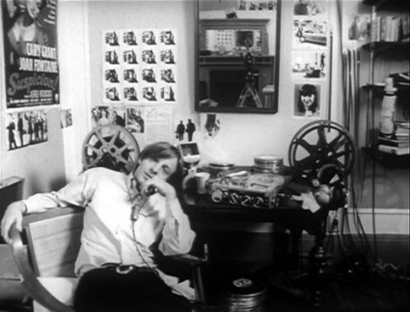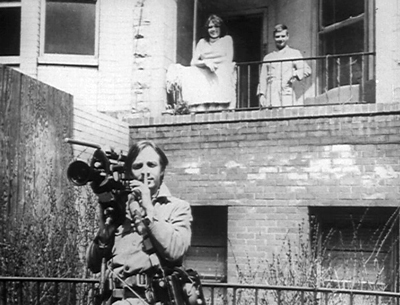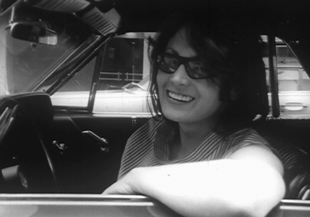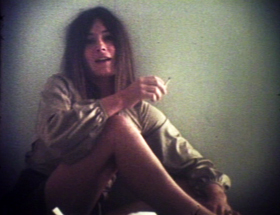
 |
|
|
|
Many a film student will feel a painful pang of recognition watching David Holzman's Diary, a remarkable proto- mockumentary that nails the psychic pitfalls of the student film generation. Back in 1967 Jim McBride and L.M. Kit Carson were given an advance to write a book about cinema-vérité documentaries. The more they learned, the more they decided that 'cinema truth' wasn't possible even in the vérité style, because the very presence of a camera transformed the "reality" being filmed. The two filmmakers spent their book advance on a seventy-minute faux-vérité epic. David Holzman's Diary purports to be a committed New York film student's attempt to achieve the cinema dream he thinks happens all the time with his director heroes Luchino Visconti and Vincente Minnelli -- he'll just film his own life as it happens and wait for the multileveled truth of his life to reveal itself. 
Those who encounter David Holzman's Diary unawares can be forgiven for taking it at face value. We see the long-haired Holzman (actually future writer & filmmaker L.M. Kit Carson) praising his noiseless 16mm Éclair camera and announcing that he's going to personally prove Jean-Luc Godard's notion that film is Truth 24 times a second. Holzman films himself talking to the lens (lots of walking forward to turn the camera on and off) and proceeds to try to document everything that happens. His only achievement is to demolish what little real life he has. Holzman's girlfriend Penny (Eileen Dietz) is a model but doesn't like having a film lens pointed at her without warning. She becomes furious when David betrays her trust by filming her on the sly -- his intrusive cinematic approach merely encourages his voyeuristic tendencies. Any film student will wince at Penny's accusation that Holzman can't relate to people except through film; we realize that our hero is enforcing a cinematic isolation upon himself. David uses his zoom lens to peep at the neighbors, Rear Window style. He talks as if he has a relationship with a woman he films in the apartment across the street. Lost in his personal world of movie art, David names her "Sandra" after a heroine from a Visconti film. He is then surprised when she doesn't answer to this imposed name. "Movie magic" doesn't seem to work very well in real life. David obsesses about movies, name-dropping famous directors and obsessing on little moments of meaning in films, none of which is a replacement for real life, or being alive. Camera-stalking a girl from the subway up to street level, he is rewarded not with a new relationship but an understandably angry response. With Penny moved out and refusing to take his phone calls, David retreats further into cinematic isolation. He spends an evening shooting one frame from every shot that pops up new on his TV set, inadvertently recording a full record of one night's programming - -Huntley and Brinkley, commercials, Batman, Star Trek, Joey Bishop, Dean Martin, Jimmy Dean, Merv Griffin and the movies Harriett Craig and Bright Eyes. We see him joyously playing with a new acquisition, an extreme fisheye lens. For a while all his shots are made with this lens. He's a hopeless case. 
David Holzman's Diary has variable audio (some dialogue is hard to make out) and a wholly convincing film-student look -- UCLA's B&W student works of art looked very similar, four years later. It's a faux- cinema vérité statement that's no different than the real thing. Amid snatches of AM radio hits, "filmmaker Holzman" arranges "meaningful" audio-visual content collisions like trucking down an endless line of elderly folk on park benches, while overlaying the sound of a vote being taken at the U.N.. We also get classic moments of street drama, as when Holzman's camera comes upon two New York cops very gently trying to help a disoriented, disheveled wino collapsed on the sidewalk. Possibly spoofing the form of Bresson's Diary of a Country Priest, Holtzman eventually collapses into "morbid self-attention". He's humiliated by a cop for peeping into Penny's window. He reaches for the truth by talking to the camera about personal issues like masturbation. We're likely to be thinking that a man alone in a room, talking into an audio-visual recording device, is engaging in something akin to cinematic masturbation. This witty jab at self-proclaimed student film geniuses hits home. "This is not coming out the way i thought it would," gripes David, who feels betrayed that his infantile camera games have not magically produced a work of insight or genius. The joke was indeed on film students when we discovered that David Holzman's Diary was what would later be called a mockumentary -- that the ordinary people we see on screen are really actors . "Sandra" from across the street and her boyfriend are really a married couple; the woman stalked on the subway an apparent relative of Jim McBride. Although the movie looks as if it were made by Holtzman, the cameraman is Michael Wadleigh, of later Woodstock fame. 
As will happen when filming, David Holzman's Diary has one reportedly "accidental" scene that's exactly the kind of magic moment Holzman is looking for. A woman in a Ford Thunderbird blocks traffic to ask Holzman what he's doing with his camera. She's like Gena Rowlands in Gloria, only much more vulgar. Her opening line is, "What're you looking for, uranium?" The woman proceeds to try to talk Holtzman, a stranger, into bed, all the while trading obscene insults with other drivers. We only wish the audio were better so we could make out all of her words. It's priceless: "I like your body. I've got a lovely happy valley, you wanna get laid?" Spoof or no, David Holzman's Diary was an instant artistic success and soon became a student/experimental film staple, written up in all but the driest film books on theories of documentary. Filmmaker Jim McBride went on to direct Glen and Randa, Breathless and Great Balls of Fire!. L.M. Kit Carson adapted Paris, Texas for the screen and co-produced Bottle Rocket. Michael Wadleigh shot for Martin Scorsese and Brian De Palma. Completely innovative in its day, David Holzman's Diary holds up both as entertainment and as a merciless dissection of film student illusions. It's a mild warning to cinephiles that wrongly regard the camera as an X-ray machine that records truth, or that believe that recording and manipulating images give a filmmaker any control over real life. Kino Lorber's Blu-ray of David Holzman's Diary is a perfect transfer of this landmark student production, restored to film by The Pacific Film Archive, the University of California and the Berkeley Art Museum. The HD image pumps every detail out of cinematographer Wadleigh's B&W images, which aren't nearly as grainy or dim as they once appeared on earlier videotapes and laserdiscs. We can now get a better look at the cinema-related ephemera cluttering the walls of David Holtzman's one-room apartment. The audio is as funky as it ever was. The restoration job has rendered most of the dialogue perfectly clear, but the marvelous encounter with the Woman in the Thunderbird is frequently unintelligible. It's a bit frustrating to discover that Kino has provided no subtitles. 
That the disc has no extras that analyze David Holzman's Diary is not a big drawback, as involved essays on the film and its relationship to documentary theory are not difficult to find. Kino instead includes three other Jim McBride "diary" films that record his underground existence post-Holtzman. They are not satires. My Girlfriend's Wedding (1969) is an uninhibited look at McBride's vagabond friends that centers on Clarissa Ainley, a Britisher who goes through with a wedding to gain a Green Card. The road picture Pictures from Life's Other Side (1971) continues the story, showing Clarissa carrying a child as the tiny filmmaking family migrates to the west. Finally, the color video My Son's Wedding to My Sister-in-law (2008) rounds up the entire McBride clan as if it were a cast of characters. The extended family is a veritable dynasty of art and film art personalities such as Kenneth Tynan and Shirley Clarke. Oddly enough, in the gentle, humorous diary film Sherman's March filmmaker Ross McElwee succeeds where Jim McBride's Holzman fails, making a film about his own relationship to several prospective girlfriends, when he's supposed to be documenting Civil War history. The difference is that McElwee doesn't mind stretching the rules of cinema vérité. He has no illusions that he's uncovering any deep cinematic truths linking film and reality.
On a scale of Excellent, Good, Fair, and Poor,
David Holzman's Diary Blu-ray rates:
Reviews on the Savant main site have additional credits information and are often updated and annotated with reader input and graphics. Also, don't forget the 2010 Savant Wish List. T'was Ever Thus.
Review Staff | About DVD Talk | Newsletter Subscribe | Join DVD Talk Forum |
| ||||||||||||||||||